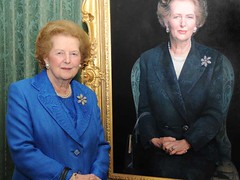Thatcher on Scottish independence

”, she has this to say about Scottish independence:
If [the Tory Party] sometimes seems English to some Scots that is because the Union is inevitably dominated by England by reason of its greater population. The Scots, being an historic nation with a proud past, will inevitably resent some expressions of this fact from time to time. As a nation, they have an undoubted right to national self-determination; thus far they have exercised that right by joining and remaining in the Union. Should they determine on independence no English party or politician would stand in their way, however much we might regret their departure. What the Scots (not indeed the English) cannot do, however, is to insist upon their own terms for remaining in the Union, regardless of the views of the others.
Until I read this, I had been puzzled about why David Cameron agreed to a referendum so readily (to the extent that I’ve been known to joke that Cameron surely must be an undercover agent for the independence movement); however, it’s now clear to me that he’s just following his bible to the letter.
Apart from explaining Cameron’s behaviour, what I find interesting about this paragraph is that I don’t think many people in the pro-independence camp will find much to disagree with. We are in favour of independence exactly because we don’t believe we can insist on our own terms for remaining in the Union, so we want to move to a situation where we are in charge of our own destiny. On the other hand, I think many Scottish Labour politicians will have problems with this Thatcher quote — the way they think they can promise more devolution after a No vote without prior approval from all major UK parties seems to imply they believe Scotland can pick and choose freely from the devolution shelf while remaining in the UK.
Would you argue for a binary choice between either full independence or the kind of single nation that Cromwell created briefly? All or nothing?
I take two main things from her subchapter on Scotland: (a) seething resentment that her philosophy was rejected in Scotland (even by Scottish Tories) and (b) a thoroughgoing consistency with regard to self-determination. This paragraph applies the same principle that she applied to the UK in the EU and to the Falkland Islanders, to Scotland.
@arcofprosperity hej! Is there a good Danish learners book? I have a friend in Funen but she’s second language Danish , tak frank
First comment: In the longer term, yes. I don’t think devolution is stable (federalism can be very stable, but I don’t think that work if one constituent part accounts for more than 50% of the population). Second comment: (a) I agree she really resented the majority of the Scottish Tories. I wouldn’t have liked this book if I was Malcolm Rifkind. 🙂 (b) Indeed. Was that different before? Are most Yes campaigners basically Thatcherites with regard to independence?
RT @arcofprosperity: New blog post: Thatcher on Scottish independence http://t.co/PxQC9ZQRAr #indyref
Pingback: Subverting Democracy, a tale of elections, the media and a Tory leader that’s went too far. (Scottish Politics) | Chic Gibson – A blog of sorts